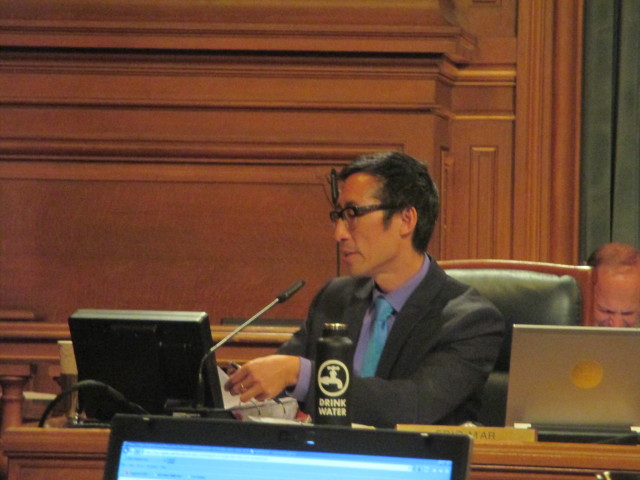
By Tim Redmond
DECEMBER 16, 2014 — A measure by Sup. Eric Mar to tax unoccupied or largely unoccupied housing units could be one of the most significant pieces of tenant legislation coming before the board in 2015, and it’s received almost no news media attention.
The bill seeks to address a growing problem in the city: Speculators, corporations, and people who want a pied a terre in San Francisco are snapping up valuable residential housing stock – and not using it for housing.
We’ve reported on this. SPUR has done a study. There’s a pretty clear problem, and it could be responsible for keeping thousands of units off the market – and making a mockery of the mayor’s attempts to supply new housing for the workforce by building 30,000 new units.
At Question Time today, Mar will ask Mayor Lee to support the idea:
Mr. Mayor, A recent story on 48 Hills found that 39 percent of condos built since 2000 have absentee owners, and for newer buildings like One Rincon Hill, that number is 50 percent or above. Luxury developments like the Four Seasons residences have more than a 60 percent rate of absentee ownership.
When wealthy people who don’t actually live here buy up San Francisco residential properties, housing prices skyrocket beyond the reach of residents, making the cost of living unaffordable for even middle income people. Not only are these wealthy absentee buyers bidding up housing prices that effectively precludes everyday residents from being able to “keep up” with the exorbitant prices, but these unoccupied units also constrict the supply of housing available to meet the high demand for our City’s growing workforce.
And as we know, one factor in high housing prices is the limited amount of new supply available for residents. The San Francisco Business Times reported last year, “With a median home price of $706,300 in San Francisco, someone earning the median income of $74,922 makes 48 percent less money than they need to afford a median-priced home.”
This sort of home owner absenteeism is also bad for neighborhoods and leads to the phenomenon of “zombie neighborhoods” that contain beautiful new luxury units but no esidents.
New York State Senator Brad Hoylman who represents part of Manhattan, has announced his intention to introduce a bill that would place a property tax surcharge on luxury homes in New York City owned by nonresidents. This kind of “pied-à-terre tax” would address a very real problem that arises when a significant number of homes are bought by wealthy out-of-towners for the simple purpose of a place to stay on occasion, as an investment, or as a hedge against market swings.
I am beginning to research legislation to address this critical problem of newly built housing that is unoccupied, can I count on your support in helping to address the issue of residential real estate hoarding by out of town buyers?
The Mar bill will need careful drafting and legal discussion, because it’s a relatively new area. But no matter what, it will force the city to acknowledge that market-rate housing isn’t solving the city’s crisis.
It will also require the city to develop something that’s badly needed: A way to check who is actually living in high-end housing.
Nobody knows for sure how extensive the problem is: Some of the apartments we identified as owned by people who don’t live there may have in fact been rented and may be occupied. Some may be used primarily for Airbnb-style short-term rentals.
Help us save local journalism!
Every tax-deductible donation helps us grow to cover the issues that mean the most to our community. Become a 48 Hills Hero and support the only daily progressive news source in the Bay Area.
The tax, if it’s high enough might encourage owners to rent out (ort actyually occupy) the places they buy, or may put a damper on the mad rush to buy high-end San Francisco residential real estate.
Some very wealthy owners may not care; they’ll just write the tax off as a cost of doing business.
But if it’s high enough, the money could be used to build or acquire affordable housing – and given the city’s needs, any new revenue source is critical.
I’m not sure how the city would enforce it – but any enforcement mechanism will provide valuable information. In the old days in Berkeley, landlords were required to register all rental units with the city’s Rent Board and list the monthly rent; that would be a fairly significant undertaking in San Francisco, but would yield reams of important data that could help guide housing policy.
Since it’s a tax, it would have to go on the ballot, although there might be a way to do it as a fee: For example, the city could require registration for every rental unit, charge of fee of $1 a year, and raise that fee substantially for units that are available for rent but not occupied.
Again, the details are going to be tricky, but this is potentially a very big deal.




